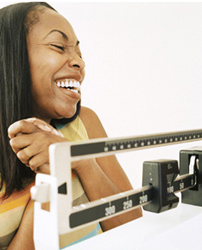4 Tips for Eating Healthy After Weight-Loss Surgery
 We’re obviously all about using good nutrition and exercise when it comes to weight loss. However, we understand that many are undergoing weight-loss surgeries, usually as a recommendation from a doctor. For people in that situation, we have these tips from Emma Squillace, co-founder of DoctorsofWeightLoss.com, a website that is all about empowering patients through bariatric surgery news, explanations of cutting-edge research and profiles of the nation’s leading weight-loss surgeons. Her tips will help you to eat right and maintain a healthy weight for life!
We’re obviously all about using good nutrition and exercise when it comes to weight loss. However, we understand that many are undergoing weight-loss surgeries, usually as a recommendation from a doctor. For people in that situation, we have these tips from Emma Squillace, co-founder of DoctorsofWeightLoss.com, a website that is all about empowering patients through bariatric surgery news, explanations of cutting-edge research and profiles of the nation’s leading weight-loss surgeons. Her tips will help you to eat right and maintain a healthy weight for life!
If you have decided to have gastric bypass or some other form of weight-loss surgery, having the procedure is just the beginning of your journey. Once you have made it through your recovery period, you need to consider a new and lifelong change to your eating habits.
When bariatric surgery is performed, whether it’s gastric bypass, gastric sleeve, a Lap-Band or anything else for that matter, the shape of the stomach is altered. With this smaller stomach comes a greater sensitivity to what foods you eat and what liquids you drink. If you are not mindful of this fact, you can be in for some uncomfortable digestive issues. If you are thinking about weight-loss surgery, here are some of the nutritional changes needed once the operation is performed…
Healthy Eating Tips for After Weight-Loss Surgery
1. You must eat small portions. Eating mini-meals is beneficial for anyone trying to lose weight, but it is essential for people who have weight-loss surgery performed. While your meals and snacks will be drastically smaller than before, you will also not feel as hungry as you used to. That’s because your stomach will now be filled with just a few ounces of food.
2. Chew and chew some more. While you will be eating drastically smaller portions at each meal after your surgery, you also need to make sure you chew your food thoroughly. Visualize your chewing habits as if you were pureeing your food, which will help with nutrient absorption. A full-size stomach can better churn food for digestion, whereas post-surgery, your smaller, post-surgery stomach needs all the help it can get.
3. Stay away from fatty foods and sugar. This is yet another approach that is beneficial to everyone but has especially negative consequences if not followed for someone after weight-loss surgery. If you have gastric bypass surgery and indulge in fried or sugary foods, you risk having dumping syndrome, which is when food is passed rapidly through your stomach and your digestive system. This results in sweating, nausea, vomiting and diarrhea. Not fun to say the least.
4. Don’t drink with your meals. Drinking water with your meals takes up valuable real estate in your new smaller stomach. You could also feel full prematurely, something you can’t afford when you are already eating so much less. Some people even report water backing up on them. However, this is not to say you should drink less water after weight-loss surgery. You should drink just as much as is suggested for anyone, but you should sip it throughout the day.
If this all seems overwhelming, just remember that you will have a one-on-one discussion with your doctor about your post-weight-loss surgery diet. So, any questions or concerns you may have can be worked out beforehand.
Thanks to Squillace for the tips! This just goes to show that no matter how you lose the weight, changing your lifestyle permanently for the healthier is a must! —Jenn
